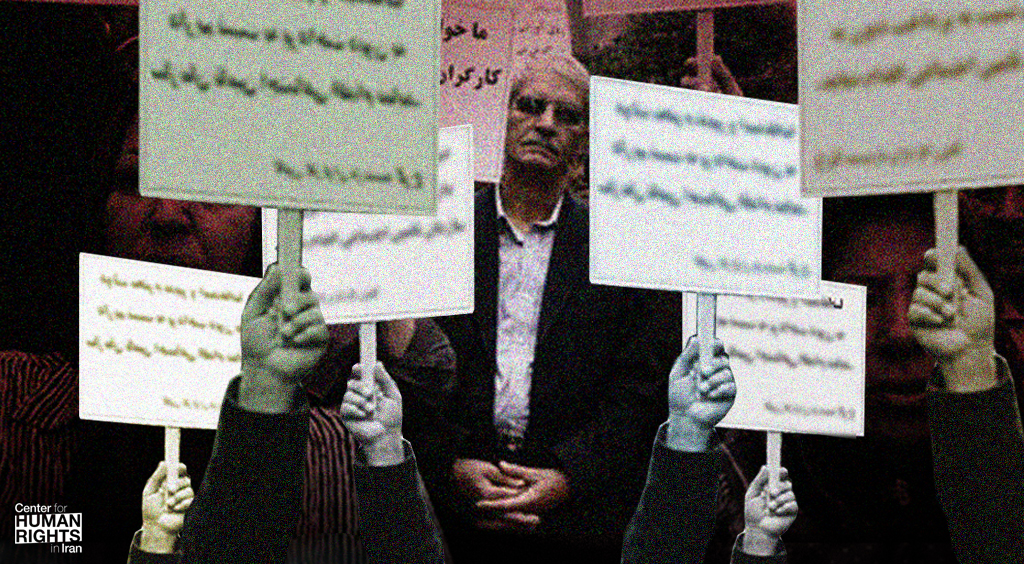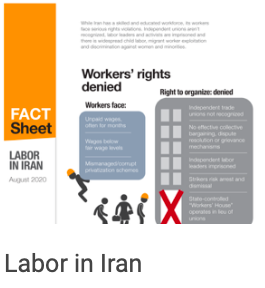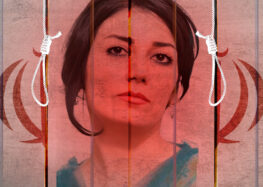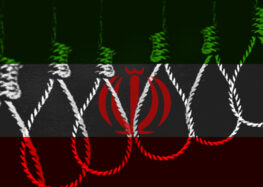Iran’s Government Should Respect—Not Crush—Workers’ Rights

Security Forces Arresting Activists to Preempt Expected Labor Day Protests
April 29, 2022 – On the eve of International Workers’ Day, state security forces in Iran have been summoning, arresting and harassing activists to prevent them from protesting on May Day. Yet labor rights advocates, who are either jailed or face state violence for peacefully raising their voices, continue to demand their rights.
“Workers all over Iran are facing months of unpaid wages and denied access to benefits, yet instead of listening to their legitimate demands, state forces focus only on silencing them,” said Hadi Ghaemi, executive director of the Center for Human Rights in Iran (CHRI).
“The Iranian government should abide by its domestic and international obligations requiring it to allow peaceful protest,” he added, “And international rights groups including the International Labor Organization should call on the Iranian authorities to respect workers’ fundamental rights.”
Iran is a signatory to the International Covenant on Civil and Political Rights, which mandates in Articles 21 and 22 freedom of association and guarantees the right to form trade unions, to the International Covenant on Economic, Social and Cultural Rights, which guarantees in Article 8 the right of workers to form or join trade unions and protects their right to strike, and to the International Labor Union’s Declaration on Fundamental Principles, which also guarantees these rights.
According to Article 27 of Iran’s Constitution, “Public gatherings and marches may be freely held, provided arms are not carried and that they are not detrimental to the fundamental principles of Islam.” Yet peaceful labor activism is treated as a national security offense in the Islamic Republic. Independent labor unions are not recognized, strikers are often fired and risk arrest, and labor leaders are prosecuted under catchall national security charges and sentenced to long prison terms.
Other key issues workers in Iran face include:
- Child labor and exploitation of migrant workers is widespread
- Workplaces are not safe; fatal work accidents in Iran are 8 times the world average
- One in three workers has no insurance, remainder are often under-insured
- Vast majority of workers employed under temporary contracts without security/benefits
- Workplace discrimination against women, minorities and people with disabilities is rife
Workers’ Rights Advocates Face Severe Repression
 Multiple workers’ rights advocates have been arrested or sentenced to prison in the days leading up to May Day.
Multiple workers’ rights advocates have been arrested or sentenced to prison in the days leading up to May Day.
This week an appeals court upheld a one-year prison sentence against labor affairs reporter Asal Mohammadi on the charges of “propaganda against the state” and “assembly and collusion against national security.”
State security forces began building a case against Mohammadi after she was arrested with a group of reporters and activists while reporting at a labor protest at the Haft Tappeh sugarcane mill in Khuzestan Province in 2018.
A lawyer who represented workers at Haft Tappeh, Farzaneh Zilabi, is awaiting the result of her appeal against one-year prison sentence for peacefully doing her job as a defense attorney, for which she was charged with “propaganda against the state” and “publishing falsehoods.”
“The rulers, the rich and the powerful are prosecuting Farzaneh Zilabi on the eve of International Labor Day to create a climate of intimidation and fear,” said the Haft Tappeh Sugarcane Workers Union channel on the Telegram app.
Meanwhile, labor rights activist Sepideh Qoliyan, who was arrested at Haft Tappeh protests in 2018, is currently in poor health while serving a five-year prison sentence in Tehran’s Evin Prison. There have been concerns for her life after she was reportedly denied proper medical treatment.
Seven labor activists were also arrested in the city of Baneh, western Iran, during raids on their homes carried out by the security forces on April 26.
Teachers’ Protests Growing
Throughout this year, teachers have been at the vanguard of workers’ rights, waging large and growing protests throughout the country while demanding fair wages and the release of their imprisoned colleagues.
This week, the Iranian Teachers Trade Unions Coordination Council issued a public call for a nationwide gathering on International Workers’ Day under the slogan, “Teachers nationwide gathering, Sunday May 1st: United teachers will not be defeated.”
Among the country’s persecuted teachers’ rights activists is Rasoul Bodaghi, who was earlier this month sentenced to four years in prison for the charge of “assembly and collusion against national security” and one year in prison for “propaganda activities against the state,” as well as banned from leaving the country or residing in Tehran.
Bodaghi, who has already been a political prisoner for engaging in peaceful activism, is a senior member of the Iranian Teachers Trade Association. His sentence was announced a day after teachers announced the May Day protests.
“The determination of Iranian workers to voice their legitimate demands despite the state’s relentless attempts to crush them demonstrates the urgency of their situation,” said Ghaemi.
“The international community, including the International Labor Organization, the UN Human Rights Council, the High Commissioner for Human Rights, the special rapporteur on Iran, and other relevant UN special procedures should speak out strongly in support of Iran’s brave workers,” Ghaemi added.






